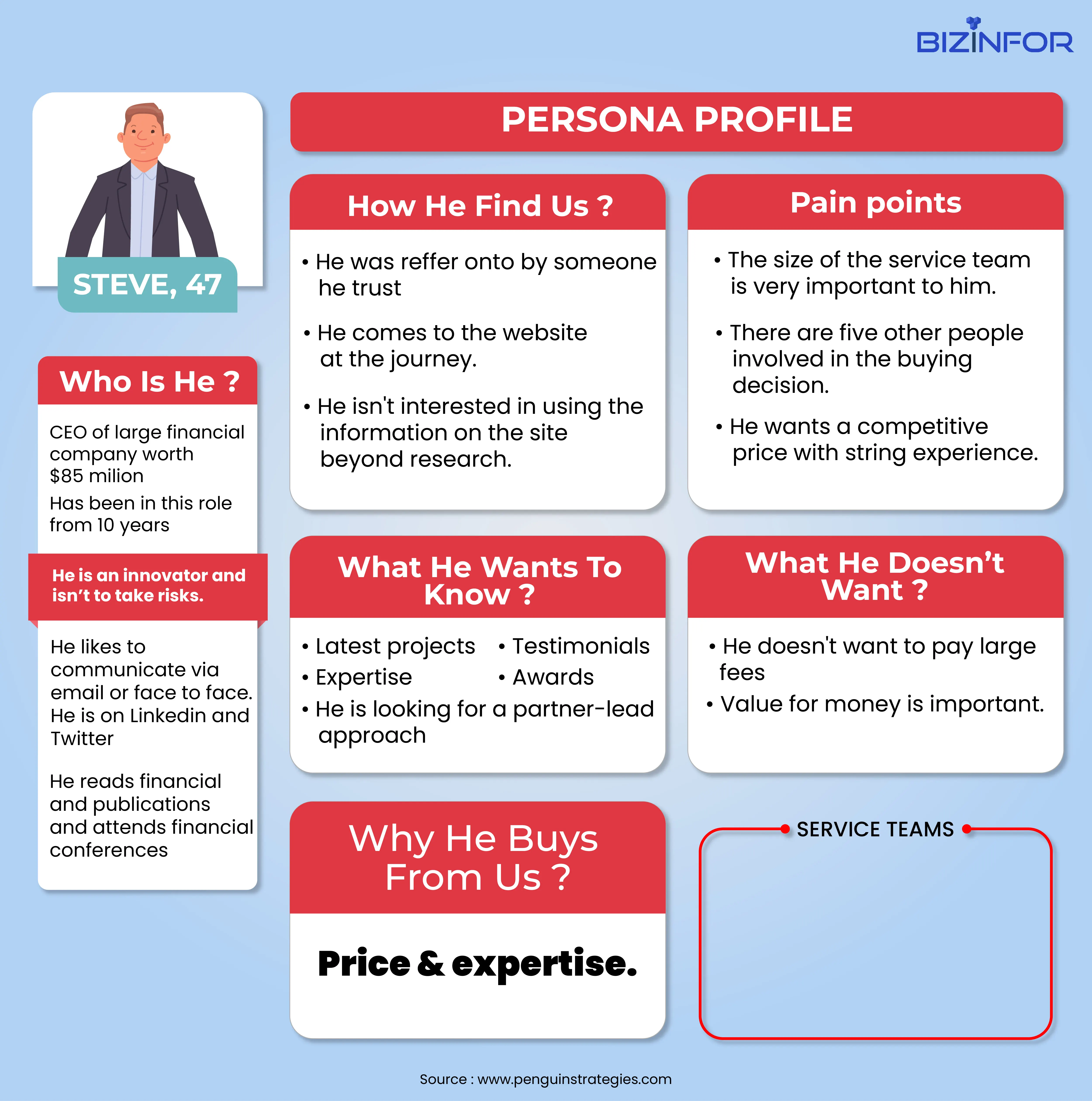As a B2B marketer or brand owner, reaching out to target prospects is your top priority. By highlighting your services to these businesses, you can increase your chances of conversion. However, not everyone in your target prospects will generate revenue for you.
Solution? Reach out to the decision-makers like senior managers, directors and other C-level executives. They’ll make the final call while buying products or services for their company.
To find these senior professionals, you need to research their profiles and ask the right questions. Explore how to find decision makers in a company and Increase your chances of closing deals!
How to Find Decision-Makers in a Company?
To market to the right leads, you need to find them first – before your competitors do. For this, you don’t have to go all in but take systematic steps.
1. Create Client Persona

Firstly, you have to develop a basic idea or description of your target B2B client. Here are some points to consider.
- Designation: Director, senior marketing manager, or vice president
- Responsibilities the employee handles
- Professional experience
- Time spent in the organization
This persona or client profile will help you simplify your search and increase your chances of determining decision maker titles. For instance, a senior product manager will be more likely to understand your product benefits than an HR manager.
2. Learn More about the Company

Market research is crucial to know more about the target company and find the decision-makers. Focusing on the organizational structure will allow you to understand the types of decision makers.
For this, visit all the official company websites to understand their business and areas of operation. Check out their LinkedIn and Crunchbase profiles for areas of operation, employee strength and other details. Remember these points to identify your ideal target executives –
- Large companies with over 500 employees can have senior employees for particular locations.
- CEOs, founders, HR managers, or Sales managers make major decisions in small seed-stage start-ups.
- Companies with less than 500 employees are run by sales managers, vice presidents, or business development executives.
3. Research Your Network

Another fantastic strategy to identify decision-making professionals is to turn to your network. Be it via LinkedIn, Facebook, or offline events, try connecting with senior executives.
For example, you can keep an eye on job changes or promotions among your LinkedIn connections. If someone just became the VP, send them a personal message about your product or service.
Similarly, if you meet a senior marketing manager at a seminar, initiate a conversation about your brand. These small steps will help you bypass the gatekeepers and reach the professionals in charge of final decisions.
However, remember to collect their contact details if possible. Then, add their emails or phone numbers to your databasefor further reference.
4. Ask the Appropriate Questions

You can follow a direct approach. Amongst your professional contacts, ask questions about their CEOs and directors. Be it an online or offline conversation, try to find out about the key decision-makers or managers.
Here are some essential questions to find the top employees conveniently –
- Which senior professionals are involved in a particular project?
- Who was in charge of the last significant business deal or marketing campaign?
- How do the teams make purchase decisions?
- What is your role in projects or final decisions?
- Can you help me connect with the top-level employees?
How Do You Reach Decision Makers?
Do you know that 63% of B2B teams have almost three decision-makers? So, with the right marketing tactics, you may connect any one of them.
If you have followed the steps in the previous section, then you already have contact and company information. So, marketing to decision makers can be successful if you utilize your available data.
1. Email Marketing

Email marketing is an excellent solution, as the average ROI on every $1 spent on email marketing is $40!
So, if you have a limited budget and a small marketing team, emails will be the best way to reach decision makers. Start by accessing your , and send emails to these targets. Use a conversational and catchy tone to highlight product benefits.
Personalize each email by mentioning the senior employee’s details (use client persona). Further, keep the headlines catchy to improve open rates. End with a simple salutation with your contact details.
2. Social Media Marketing

When you’re thinking about how to reach decision makers, you can’t ignore social media. No wonder the social media ad budget will be around $72.33 billion in 2023!
Famous marketing author Seth Godin said, “Marketing is no longer about the stuff you make, but about the stories you tell.” That’s why social media will be ideal for talking about your brand through a storytelling approach.
Begin by posting content about your brand regularly on multiple social media platforms like LinkedIn and Instagram. Post text content on LinkedIn and video content on Instagram. Next, focus on the comments, impressions, and interactions from your target audience.
Emphasize publishing high-quality content to attract target decision-makers. Also, reply to the comments and answer questions from your audience. It’ll help you connect better with them.
When you feel your brand image is improving, contact target companies for business opportunities.
3. The power of Referral marketing

As per 84% of decision-makers, referrals are crucial for B2B purchases. So, ask for referrals from your business allies, partners, and even loyal clients. When you’re thinking about how to reach decision makers in business, they might offer valuable contacts.
Ask for testimonials, reviews and if they might connect you with the bosses. If you have collaborated with a client previously, reach out to them too.
The Bottom Line
We hope that this post helped you understand how to reach business decision makers. To be able to reach decision makers for your brand, you have to continue expanding your contact database.
Keep on interacting with your current clients and target clients via social media regularly. It will keep you in the loop of their latest events, hiring, mergers, and other vital details.
However, to expand your business and reach top professionals, focus on your product development. No matter how effective your marketing strategies are, your brand will speak on your behalf in the end.




